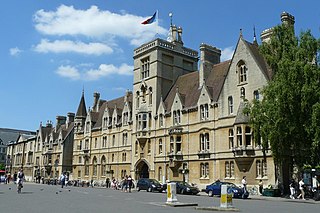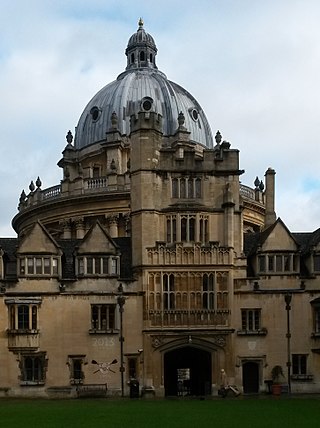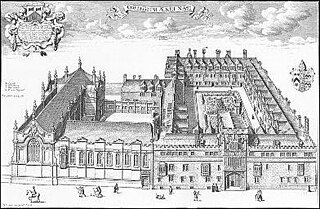
Balliol College is a constituent college of the University of Oxford. Founded in 1263 by John I de Balliol, it has a claim to be the oldest college in Oxford and the English-speaking world.

Brasenose College (BNC) is one of the constituent colleges of the University of Oxford in the United Kingdom. It began as Brasenose Hall in the 13th century, before being founded as a college in 1509. The library and chapel were added in the mid-17th century and the new quadrangle in the late 19th and early 20th centuries.

Campion Hall is one of the four permanent private halls of the University of Oxford in England. A Catholic hall, it is run by the Society of Jesus and named after Edmund Campion, a martyr and fellow of St John's College, Oxford. The hall is located on Brewer Street, between Christ Church and Pembroke College. The buildings, along with many of the fixtures and fittings, were designed by Sir Edwin Lutyens, his only buildings in Oxford. The hall also houses an extensive collection of religious art spanning 600 years; the pieces were collected primarily by Fr Martin D'Arcy in the 1930s.

Pembroke College, a constituent college of the University of Oxford, is located on Pembroke Square, Oxford. The college was founded in 1624 by King James I of England and VI of Scotland, using in part the endowment of merchant Thomas Tesdale, and was named after William Herbert, 3rd Earl of Pembroke, Lord Chamberlain and then-Chancellor of the University.

St Benet's Hall was a permanent private hall (PPH) of the University of Oxford, originally a Roman Catholic religious house of studies. It closed in 2022. The principal building was located at the northern end of St Giles' on its western side, close to the junction with Woodstock Road, Oxford.

Kellogg College is a graduate-only constituent college of the University of Oxford in England. Founded in 1990 as Rewley House, Kellogg is the university's 36th college and the largest by number of students both full and part-time. Named after the Kellogg Foundation, as benefactor, the college hosts research centres including the Institute of Population Ageing and the Centre for Creative Writing. It is closely identified with lifelong learning at Oxford.

The University of Oxford has 36 colleges, three societies, and four permanent private halls (PPHs) of religious foundation. The colleges and PPHs are autonomous self-governing corporations within the university. These colleges are not only houses of residence, but have substantial responsibility for teaching undergraduate students. Generally tutorials and classes are the responsibility of colleges, while lectures, examinations, laboratories, and the central library are run by the university. Students normally have most of their tutorials in their own college, but often have a couple of modules taught at other colleges or even at faculties and departments. Most colleges take both graduates and undergraduates, but several are for graduates only.
John Barton is a British Anglican priest and biblical scholar. From 1991 to 2014, he was the Oriel and Laing Professor of the Interpretation of Holy Scripture at the University of Oxford and a Fellow of Oriel College. In addition to his academic career, he has been an ordained and serving priest in the Church of England since 1973.

Jonathan A. Jones is a professor in atomic and laser physics at the University of Oxford, and a fellow and tutor in physics at Brasenose College, Oxford.

Bridget Kendall is an English journalist who was the BBC's Diplomatic correspondent working for the corporation's radio and television networks. From 2016 to 2023, she was Master of Peterhouse, Cambridge: the first woman to head the college.
John Lloyd Ackrill, was an English philosopher and classicist who specialized in Ancient Greek philosophy, especially the philosophy of Plato and Aristotle. Ackrill has been said to be, along with Gregory Vlastos and G. E. L. Owen, "one of the most important figures responsible for the upsurge of interest in ancient Greek philosophy among Anglo-American philosophers of the second half of this century".
Daniel Walker Howe is an American historian who specializes in the early national period of U.S. history, with a particular interest in its intellectual and religious dimensions. He was Rhodes Professor of American History at Oxford University in England and Professor of History Emeritus at the University of California, Los Angeles. He won the 2008 Pulitzer Prize for History for What Hath God Wrought (2007), his most famous book. He was president of the Society for Historians of the Early American Republic in 2001, and is a Fellow of both the American Academy of Arts and Sciences and the Royal Historical Society.
John Andrew Todd is a British geneticist who is Professor of Precision Medicine at the University of Oxford, director of the Wellcome Center for Human Genetics and the JDRF/Wellcome Trust Diabetes and Inflammation Laboratory, in addition to Jeffrey Cheah Fellow in Medicine at Brasenose College. He works in collaboration with David Clayton and Linda Wicker to examine the molecular basis of type 1 diabetes.
The Faculty of Medieval and Modern Languages is a department of the University of Oxford, England. It is part of the university's Humanities Division.

Lucy Newlyn is a poet and academic. She is Emeritus Fellow in English at St Edmund Hall, Oxford, having retired as a professor of English Language and Literature at the University of Oxford in 2016.
Michael Andrew Screech, FBA was a cleric and a professor of French literature with special interests in the Renaissance, Montaigne and Rabelais.
Vincent Gillespie, FEA is Emeritus J. R. R. Tolkien Professor of English Literature and Language at the University of Oxford. He was editor of the Exeter Medieval Texts and Studies Series from 2002 until 2023, and was the Honorary Director of the Early English Text Society from 2013 until 2023, having previously served as its Executive Secretary from 2004 until 2013. His major research area is late medieval English literature. He has published over sixty articles and book chapters ranging from medieval book history, through Geoffrey Chaucer and William Langland, to the medieval mystics such as Richard Rolle and, most recently, Julian of Norwich. He has a special interest in the medieval English Carthusians, and in Syon Abbey, the only English house of the Birgittine order. In 2001, he published Syon Abbey, Corpus of British Medieval Library Catalogues 9, an edition and analysis of the late-medieval library registrum of the Birgittine brethren of Syon Abbey. He is the author of Looking in Holy Books, and the forthcoming A Short History of Medieval English Mysticism. He is the co-editor, with Kantik Ghosh, of After Arundel: Religious Writing in Fifteenth-Century England, with Susan Powell of A Companion to the Early Printed Book in Britain, 1476-1558, with Samuel Fanous of The Cambridge Companion to Medieval English Mysticism, and with Anne Hudson of Probable Truth: Editing Medieval Texts from Britain in the Twenty-First Century.
Sophie Marnette is Professor of Medieval French Studies at the University of Oxford and the Dervorguilla Fellow and Tutor in French at Balliol College. She is a specialist in French Linguistics and Medieval French Literature. She was the Chair of the Sub-Faculty of French (2016-18) and was a Proctor for the University of Oxford. She is a founding and executive member of Ci-dit, an international research group on reported discourse.
Matthew Smyth was the first Principal of Brasenose College, Oxford.

St Benet's Hall Boat Club is a rowing club in Oxford. It used to be the boat club of now defunct St Benet's Hall, Oxford. It is based on the Isis at Boathouse Island, Christ Church Meadow, Oxford.













